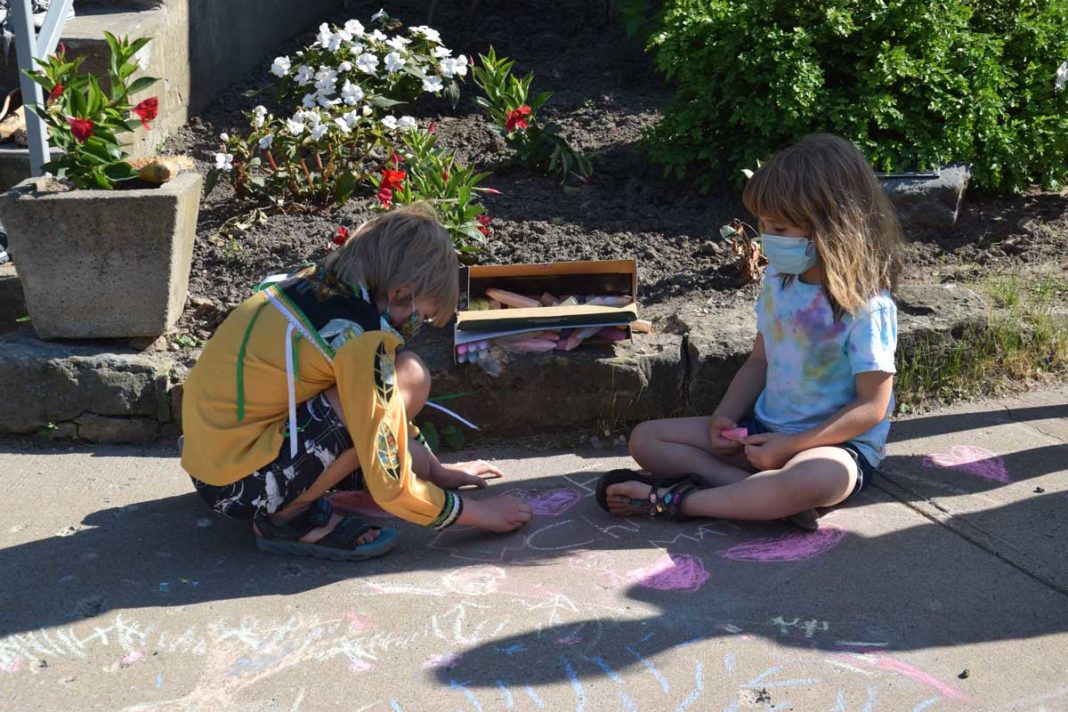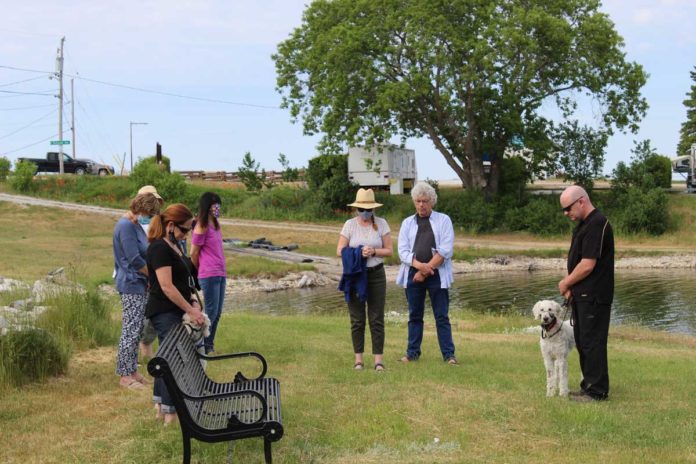LITTLE CURRENT—A small crowd gathered on the lawn of Little Current United Church for a COVID-19 protocol gathering recently to honour the memories of the 215 children discovered in unmarked graves near the location of a former Kamloops residential school.
The early evening gathering was facilitated by the new pastor of the Little Current and Sheguiandah United Churches, Reverend Whitney Bruno, who welcomed the gathering by acknowledging the traditional lands of the Anishinaabek, especially the Whitefish River, Sheguiandah and Aundeck Omni Kaning First Nations and following her opening remarks invited those in attendance to step up to the microphone to share their thoughts and memories. “Every Sunday we acknowledge the Odawa, the Potawatomie and Ojibwe as stewards of this land,” she said.
Rev. Bruno spoke of the tragedy that had brought the community together in memorial, and how that tragedy continues onto the present day, but emphasized that “this can’t be the end, we have to continue the conversations, making amends and being a community.”
She then opened with a prayer that spoke of the dream of a present when racism and hatred would be extinguished and a present when the environment would be protected.
Aundeck Omni Kaning Ogimaa-kwe Patsy Corbiere thanked the United Church congregation for the gathering, going on to say that the discovery of the 215 unmarked children’s graves was “unimaginable” and those 215 children never having been returned home to their families was nothing short of a “huge tragedy.”
She noted that the survivors of the residential school system not only lost much of their language and cultural heritage, but also that many went on to suffer the ravages of alcohol and other addictions, facing ridicule and contempt of not only mainstream society but even of their own community members who had little or no understanding of what they had gone through.
“With all these bodies being found, people are being retraumatized,” she said. “They should never have had the power to take kids away from their families.” Indigenous communities must get out from under the Indian Act, she said.
“No other race in Canada has an act to tell them how they are supposed to live,” she said.
But Ogimaa-kwe Corbiere also spoke of her hope for the future, as more and more Indigenous students have gone on to achieve higher education, including at the PhD level.
Retired Manitoulin Publishing co-owner Rick McCutcheon then stepped up to the microphone to recall a conversation with the late Violet McGregor, herself a former councillor and force to be reckoned with in her community of Whitefish River First Nation, following a lecture series at the Ojibwe Cultural Foundation by Dr. Alan Corbiere.
Ms. McGregor told him of a time when the boat bringing the children back from the school at Spanish was delayed by weather, having to hold up at one of the communities along the way.
Nobody bothered to call the community to let anyone know that the boat and children were safe. “So the parents assumed the worst that the boat had capsized and the children lost,” he said. “She said ‘it never occurred to anyone to call. How disrespectful that was for us all’.”
Former Sheguiandah First Nation Ogimaa Norm Augonie recalled stories from his experiences through the years. He spoke of his experiences with residential school and survivors.
One survivor told him, “’I learned two things there, to hate and to steal’.” Mr. Augonie told how younger students would be beaten by older students with a strap or they in turn would be beaten. “It was the older boys who delivered the punishment,” he said. He recalled how one former student told him ’You know Norman, if I met that guy today I would kill him’.” It was a sentiment repeated by another survivor speaking of a fellow community member in Wiikwemkoong who was ready to act on his impulse to murder his tormentor; luckily Mr. Augonie was able to dissuade him. The children were taught to hate not only the white teachers and administrators at the school, but their own people. It was literally a campaign designed to instill self-loathing in a people.
Later, Mr. Augonie advised people to watch the movie ‘Indian Horse.’ “It is painful, but you will learn a lot.”
Former Little Current Public School principal John Hodder spoke of how when first coming to the community he noticed a school bus packed with children down by the then Edgewater Restaurant and learned they were being transported to the residential school in Spanish.
He spoke of his own campaign to include Island Indigenous children at the school. All children at the school were treated the same and received the same education, with some of those children being honoured as the top student at the school.
“We should all be equal,” he said. “Every child matters.”
His comments were later vindicated by former student Lylah Aguonie, the daughter of Norm Augonie, who also spoke at the gathering to share her thoughts. She noted that her experience at Little Current Public School was free from the kinds of oppression and racism experienced at residential schools.
A recent immigrant to Canada who did not identify herself spoke about the disbelief she felt when first hearing about the residential schools about five years ago. “I heard a lot of people, especially on social media, saying ‘at least they received an education.’ That’s not the point,” she said. “They were taken away from their families, the parents sent their children but they did not know if they would be coming back. That’s what you have to remember.”
Garrett, a young man who stepped up to the microphone, spoke of how much he was learning about Indigenous peoples. “I have been learning about the history of Indigenous people, First Nations people. In school we are taught Canada is a lovely place,” he said, “in reality it has a lot of flaws.” He referenced the poor treatment of Indigenous people even before the implementation of the residential school system. “Anything you can do to spread the word, do it,” he said. “The government will only act if they are forced to do it. So do anything you can to help.”
Ms. Augonie thanked the community for coming together over this issue. She said she has learned that Canada has “been built on many lies.”
“My mom never talked about the residential school, she stayed pretty quiet about it,” she said. “Later, my mom apologized to me for not teaching us the language. In residential school she was taught that our language was the language of the devil.”
The history of residential school was not in her history books. “I learned about Christopher Columbus,” she said. As for her people, they were referenced as savages.
It was not until much later that she learned about that history.
“Even through those eight years that she went through residential school, she didn’t learn to read or write, she was self-taught,” she said. “She learned to survive.”
Once her mother was in residential school she lost her name, she became number seven.
Retired Crown prosecutor Lorraine Ottley spoke of the ongoing trauma that she saw and the post traumatic disorder that came from intergenerational trauma.
“A lot of residential school survivors ended up with PTSD and came home without the ability to raise their own children, how to show love,” she said. “Their children end up in the courts, and then their grandchildren. Criminality is not inheritable, but the results of residential schools are inheritable in my view. When we talk about residential schools, we are not just talking about a group of very elderly people, the effects go on generation after generation.”
A non-Native who identified himself as Steve who married a woman from Birch Island spoke next. “Nobody ever talked about residential school,” he said. “My two daughters don’t see their mother, intergenerational trauma has impacted my family. My ex and I broke up, but we didn’t know why. My kids are traumatized, my grandkids are traumatized.”
He suggested that the RCMP should not be the ones investigating the residential school system as they were part of it.
Kim Kitchikake spoke of her mother’s experience. “Growing up my mother would tell us about residential school. She always spoke humbly about it, she said, ‘don’t blame them’,” she said. Her mother became an alcoholic and dependant on drugs, mostly anti-depressants.
“She never believed she was loved, and she told us over and over again that ‘you don’t love me’,” she said, her voice cracking with emotion. “I spent most of my life watching her suffer from depression. My siblings (she is the youngest of five) growing up in that toxicity, never believing that they could go on to become educated.”
Her mother later began to learn her language, going “full force with my aunt” in her 50s to make up for lost time, but the inability to feel or express love had a huge negative impact on all of her children.
Each of the participants at the vigil were encouraged to place a candle among the shoes displayed on the steps of Little Current United Church and to say a little prayer for the children and those who survived the residential school system and their descendants.





